Your Cart is Empty
Menu
-
- Home
- Equipment
- Contact
- Tennant Parts
- Tennant CS5 Parts
- Tennant 5100 Parts
- Tennant 5280 Parts
- Tennant 5300 Parts
- Tennant 5400 Parts
- Tennant 5680 Parts
- Tennant 5700 Parts
- Tennant 7100 Parts
- Tennant 7200 Parts
- Tennant 7300 Parts
- Tennant 7400 Parts
- Tennant T1 Battery Parts
- Tennant T1 Corded Electric Parts
- Tennant T2 Parts
- Tennant T3 Parts
- Tennant T5 / T5E Parts
- Tennant T7 Parts
- Tennant T7AMR Parts
- Tennant T12
- Tennant T15 Parts
- Tennant T16 Parts
- Tennant T17 Parts
- Tennant T20 Parts
- Tennant T290 Parts
- Tennant T300 / T300E Parts
- Tennant T390 Parts
- Tennant T500/T500e Parts
- Tennant T600 / T600E Parts
- Tennant i-mop Lite Parts
- Tennant I-Mop XL Parts
- Tennant I-Mop XXL Parts
- Tennant 636 Green Machines Parts
- Tennant 800/810 Parts
- Tennant 830 II Sweeper Parts
- Tennant 3610 Parts
- Tennant 3640 Parts
- Tennant 4300 ATLV Parts
- Tennant 6100 Parts
- Tennant 6200 Parts
- Tennant 6400 Parts
- Tennant 6500 Parts
- Tennant 6550 Parts
- Tennant 6600 Parts
- Tennant 6650 Parts
- Tennant S3 Parts
- Tennant S5 Parts
- Tennant S6 Parts
- Tennant S7 Parts
- Tennant S8 Parts
- Tennant S9 Sweeper Parts
- Tennant S10 Parts
- Tennant S20 Parts
- Tennant S30 Parts
- Tennant Sentinel Parts
- Tennant 92 Parts
- Tennant 95 Parts
- Tennant 97 Parts
- Tennant 110 Parts
- Tennant 240 Parts
- Tennant 250 Parts
- Tennant 255 Parts
- Tennant 255 II Parts
- Tennant 265 Parts
- Tennant 275 Parts
- Tennant 275 II Parts
- Tennant 280 Parts
- Tennant 8200 Parts
- Tennant 8300 Parts
- Tennant 8410 Parts
- Tennant M17 Parts
- Tennant M20 Parts
- Tennant M30 Parts
- Tennant 255 Parts
- Tennant 255 II Parts
- Tennant 275 Parts
- Tennant 275 II Parts
- Tennant 285 Parts
- Tennant 1120 parts
- Tennant 1610 Parts
- Tennant 2510 Burnisher Parts
- Tennant B5 & B7 Burnisher Parts
- Tennant / Nobles BR-1600-NDC parts
- Tennant E5 Carpet Extractor Parts
- Tennant Q12 Parts
- Tennant R3 Parts
- Tennant R14 Carpet Extractor Parts
- Tennant 3500 3520 3530 3540 3560 & 3580 Replacement Parts
- FM-17-SS / FM-20-SS / FM-20-DS Parts
- Tennant / Nobles V-WD-15 parts
- Tennant 1200 Parts
-
- Tennant Parts
- 866-766-5553
- Login
- USD
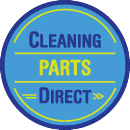
Choosing the right brush material for your sweeper or scrubber
September 11, 2014 4 min read
So you've got your automatic floor scrubber or your riding floor sweeper and you're not sure which floor brush or floor pad to use with it. This topic has generally already been covered in another post CLICK HERE TO READ. In this blog, we're going to dig a little deeper into the various materials you may have in front of you when selecting a floor cleaning brush.
Proex is an "X" shaped filament of polypropylene that performs well in both dry and humid or damp conditions. It's very cost effective and is one of the most popular brush fibers used with cleaning equipment. It is not recommended for use in high heat conditions. The fibers can come in various thicknesses. Some manufacturers produce a Proex and Wire combination brush that is very effective in a wide range of sweeping conditions. Proex brushes can be used indoors or outside. If the filaments are soft enough, they can even be used on VCT with floor finish, but it's probably too rough for everyday use without damaging the finish.
Polypropylene is the basis of Proex. Polypropylene has good bend or flex recovery, but it can set if bent for a length of time. Polypropylene brushes are fairly resistant to chemicals, solvents and other oils which make them excellent choices for use with cleaning equipment and floor scrubbers. Polypropylene has limited sunlight resistance, but this can be increased by making the filaments black. Notice that all of Tennant's polypropylene brushes are black. Hmm, wonder why? Polypropylene brushes can be used indoor or outside on various flooring types. Like Proex, they can be used on VCT with floor finish but it's not really recommended as it will remove floor finish or at least dull it up.
Nylon is a fiber that is more flexible and durable than polypropylene. It performs well in dry conditions but not as well in wet when sweeping. Brush life expectancy is very good with nylon material. Nylon does a good job on rough surfaces and in high heat conditions because of its durability. Tennant's nylon brushes are all colored white. Nylon can be used indoor or out, and nylon is recommended for VCT with floor finish if you're determined to use a brush on floor finish. This can be a useful tool if you're tired of changing floor pads constantly. Nylon brushes can be hosed off after use whereas a floor pad gets thrown away.
Union fibers are actually natural fibers like Tampico and Palmyra. These brushes are excellent at keeping dust down in dry sweeping conditions, but because they are natural materials their life is shorter than the synthetic materials mentioned above. Union and natural material brushes can be combined with wire to give them added strength and to extend their use. Union fiber brushes are really for floor sweepers only, but they can be used indoor or outdoor.
Grit brushes use a base of durable nylon filament that is then coated with silicon carbide grit particles. Grit scrubbing brushes come in many different sizes and roughness. They're typically rated as follows: .070"/46, where the first number is the thickness of the fiber. The thicker the fiber, the stiffer the brush will be. The second number is the grit size, and like sandpaper the smaller the number the rougher it is. Grit brushes can be used indoors on hard surfaces like concrete. If they're too stiff they can damage some hard floor types, especially if left running in the same spot for more than a few seconds or if the down pressure is set too high. Some people will try to use these brushes to strip floor finish along with a chemical stripper. It doesn't work as well as a black floor pad simply because the pad has greater surface are coverage.
Tennant Grit
- Larger cylindricals are .060”/46 Grit
- Smaller cylindricals are .050”/80 Grit
- Disks are .060”/46 Grit
Aftermarket Grit
Crimped wire, or simply wire brushes, are made from metal wires and are used when extra tough cutting performance is required to break up stubborn dirt and soils. Often, wire cleaning brushes are combined with polypropylene or natural fibers to help control dust as the wire breaks free the soils. Wire brushes are for use outdoors primarily, but they can be used on very rough surfaces anywhere. One problem with using a wire brush is that it is made of metal. If it comes in contact with water, the brush will rust and break off. This siginificantly reduces the life span of your brush.

What is the Difference Between Single Row and Double Row Brushes?
24 Single row is better for fine debris, sand with no large debris.
The 8 Double Row allows larger debris as there are gaps in the brush to sweep them.
Nylon Polypropylene Super Abrasive (46 Grit)
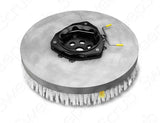
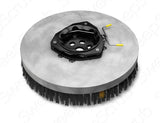
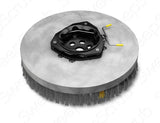
Nylon Polypropylene
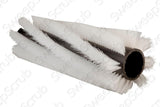
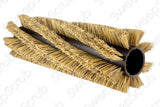
Free shipping when you become a member
Sign up below!